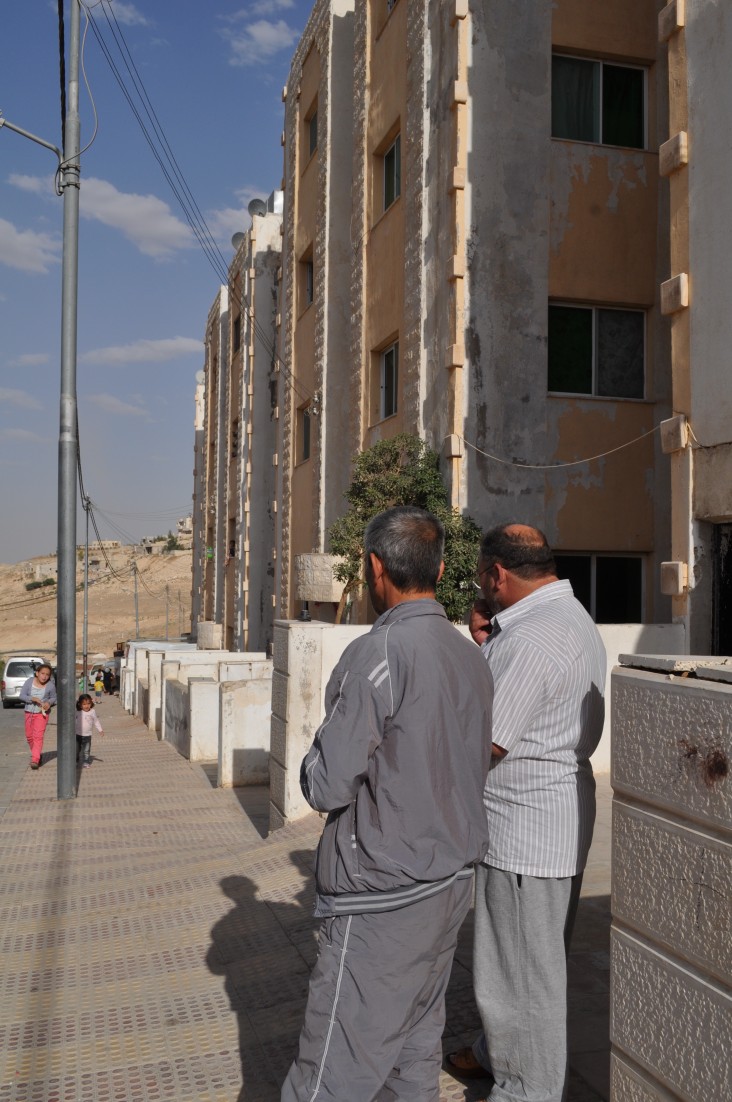Speeches Shim

November 2015—It’s a normal looking apartment building in the Marka neighborhood on the outskirts of Amman, Jordan—an apartment block you might find in any city in the world. But living inside the five-story building painted yellow and white are eight Syrian families.
Donated by private owners, this apartment block and others next door house as many as 80 to 100 Syrian families. These families are bound by tragedy—they all have relatives who died inside Syria before they could escape—but are also bound by their will to survive.
Abu Raafat* and Abu Maher are neighbors in the building. They live across from each other, and are constantly moving back and forth between each other’s apartments throughout the day.
Abu Raafat, a bus driver from Dara’a Governorate, lost two sons in 2011, one week apart. His remaining two sons and two daughters (ranging in age from 9 to 22) fled with him and his wife nearly three years ago.
Abu Maher had also been a bus driver in Syria, and was working in Qatar as a truck driver when the conflict started. He and his wife lost their 11-year-old son in a car accident before the conflict began. The conflict multiplied what already seemed like an immeasurable loss.
Sawsan, Abu Maher’s wife, was stunned. “I almost lost my mind. It was crazy,” she said. “I lost three sons one month apart. I would tell one casually to go out and get milk, and the next day he was gone.” Two were killed by sniper fire, one by bombing. The oldest, Maher, left behind his wife Botheina and son Muhamad.
“Abu Maher became more considerate and attentive after losing four of our sons. He has tried his best to get us what we need,” said Sawsan of her husband.
Sharing their grief has brought them closer together. “I’m just trying my best, because Sawsan slipped into depression and was unwilling to go on, so I’m trying to give her a reason to go on,” said Abu Maher. Their spirited and happy 2-and-half-year-old daughter Samaher has helped.
Both families tell similar stories of fleeing Syria—traveling to the Syrian village nearest to the Jordanian border by car, then walking on foot at night to avoid snipers as they made their way to safety.
“They were targeting people as if we were animals, hunting us,” said Abu Maher. “And once people were caught, they would disappear. We would have no idea if they were alive or dead.” Both families eventually made it to Amman, and found this building with other Syrians who understand their struggles.
Life was not so bad at first for both families—they were receiving $34 food vouchers each month for each family member. They managed to buy meat occasionally, and gave their kids milk. Their apartments in Marka have been rent free, with only bills for water and electricity (around $30-$42 per month for each).
But in late 2014, both families were cut off entirely from food assistance for a time, due to the funding shortfalls experienced by the U.N. World Food Program (WFP). Abu Raafat said that in the period when assistance stopped, his kids went hungry and he wasn’t able to afford school for them all. How do you choose which of your children gets to go to school?
Fortunately, with an additional influx of funding in mid-October, WFP restored food assistance at a rate of $14 per person per month for now. While not the full support refugees initially got, it helps keep food on the table.
“Our dreams are very simple,” said Abu Maher. “To have a decent living that would allow us to be sufficient and not put out a hand to beg. We want people to look at us as humans, because we’re just like them.”
Abu Raafat added, “I just want to feed my kids, and keep them in school.”
*Name changed.

Comment
Make a general inquiry or suggest an improvement.